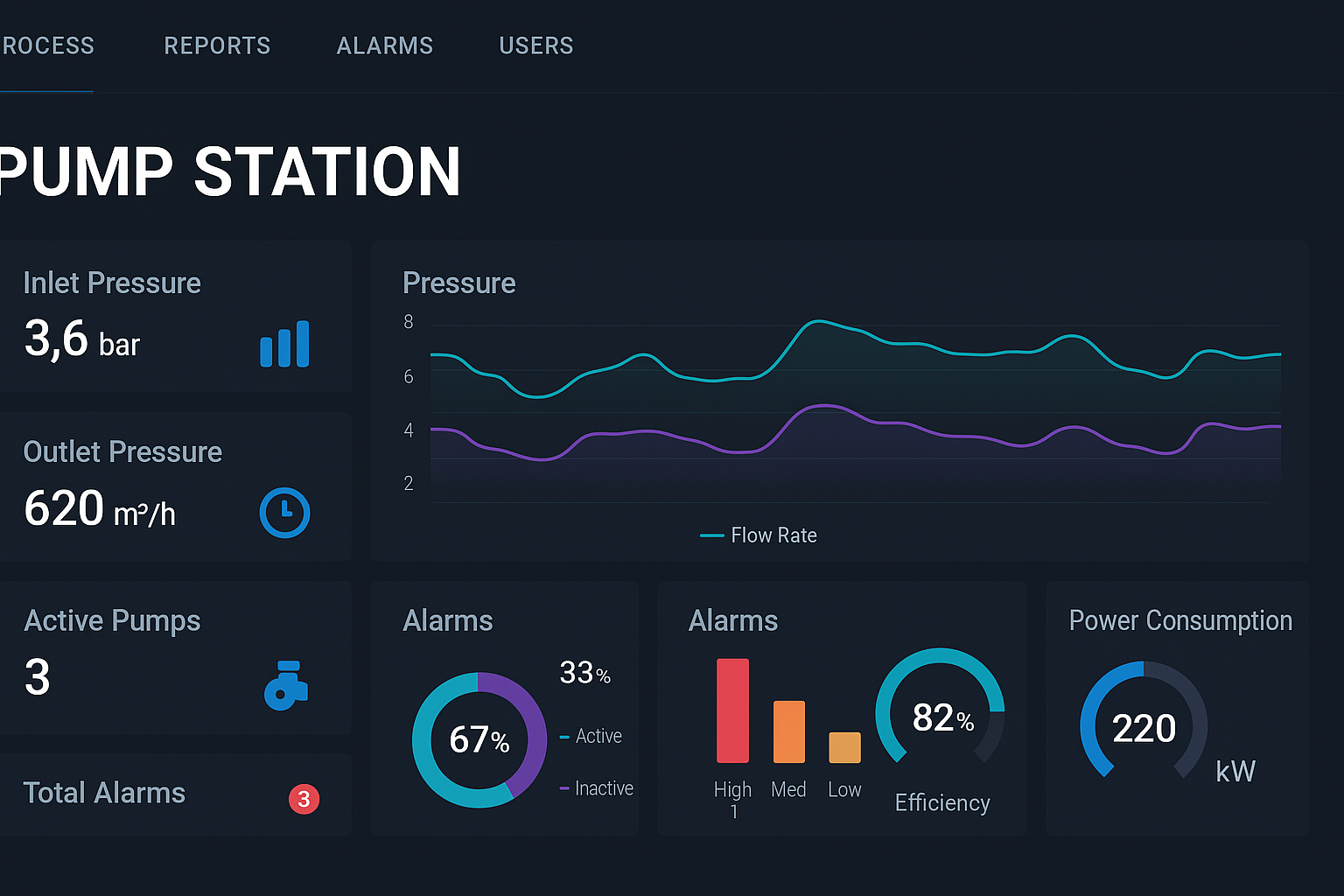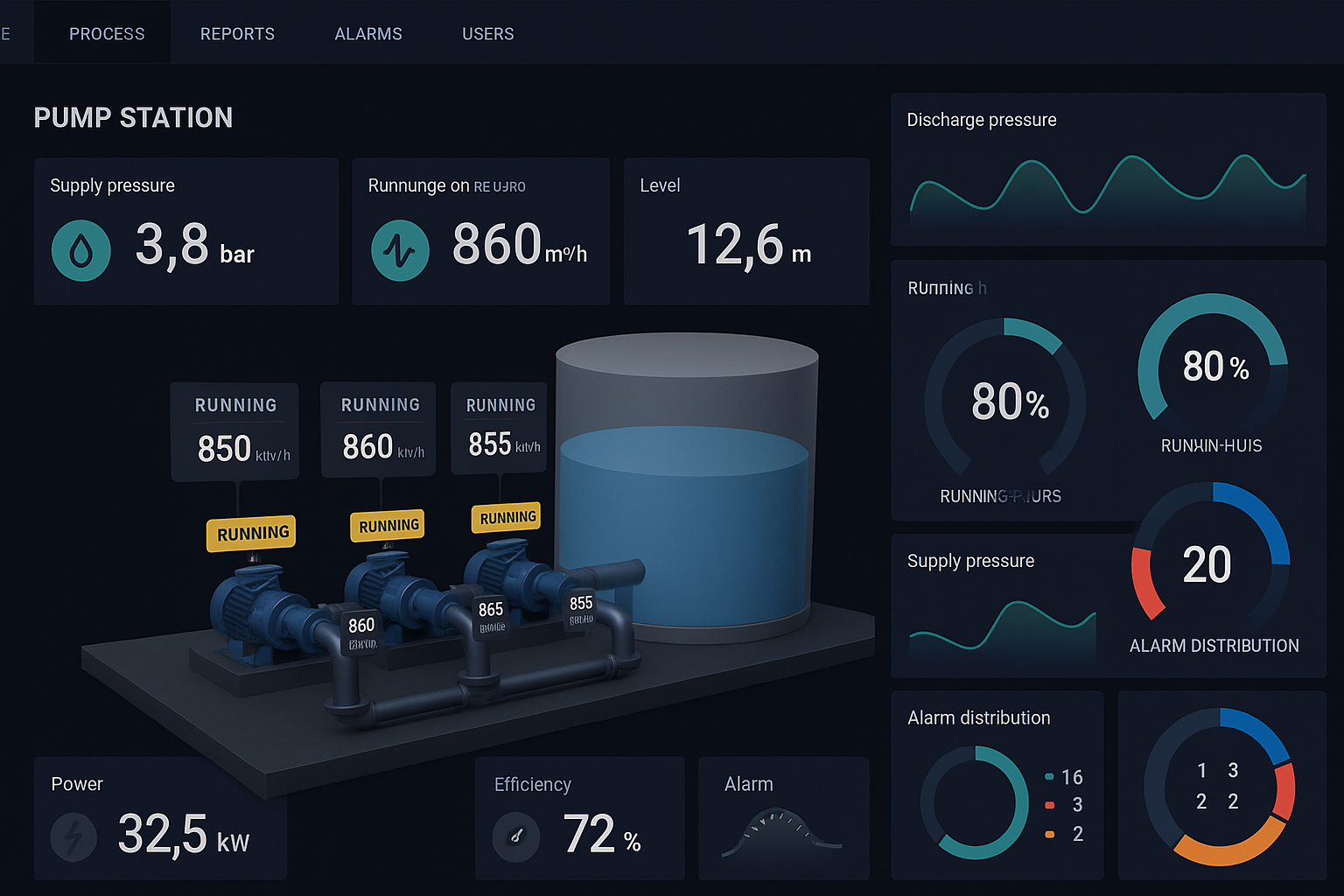
PUMP STATIONS
WHAT CAN DO WITH Q4S IN PUMP STATIONS

Automated Reporting System

Cyber Secured

Full Integration

GIS Integration

Historical Data

Live Dashboard and KPIs

Smart Alarming & Notifications

User Management
Pump Station Solutions
Pump stations are essential for transporting water, wastewater, or other fluids across municipal ,industrial, and utility infrastructure. Whether in potable water networks, sewage systems, or irrigation schemes, pump stations must operate reliably, efficiently, and safely under varying load and environmental conditions. Our smart solution provides real-time monitoring, intelligent control, and centralized management of pump station assets. By integrating PLC/SCADA systems, IoT sensors, and cloud-based analytics, we enable predictive maintenance, energy optimization, and fault detection across single or multiple pumping stations
Benefits
- Increased system uptime and reduced emergency shutdowns
- Lower energy costs through pump efficiency optimization
- Faster issue resolution with smart alarms and diagnostics
- Prolonged pump and motor lifespan via predictive insights
- Full visibility across distributed pumping infrastructure
- Improved water network stability (pressure/flow control)
- Better planning and asset lifecycle management
- Scalable for cities, industrial zones, or irrigation networks

Key Features
- Real-time monitoring of pump performance (flow, pressure, RPM, vibration)
- SCADA integration for centralized control of all stations
- Intelligent pump sequencing and load balancing
- Automatic switching between duty, standby, and emergency pumps
- Remote fault detection and predictive maintenance analytics
- Energy consumption tracking and efficiency optimization (kWh/m³)
- Tank level and pressure zone monitoring
- Leak and overflow detection with alarm management
- GIS-based map view and mobile access for remote teams
- Reporting and audit logs for operations and compliance

- PLC/SCADA control for pump start/stop, speed, and sequencing
- Flow meters, pressure sensors, level transmitters, vibration/temperature monitoring
- VFD integration for energy-efficient motor control
- Automatic switchover logic for duty/standby configuration
- Local HMI panels and remote access via cloud dashboards
- Flow meters, pressure sensors, level transmitters, vibration/temperature monitoring
- VFD integration for energy-efficient motor control
- Automatic switchover logic for duty/standby configuration
- Local HMI panels and remote access via cloud dashboards
- Monitoring of pipeline pressure, flow, and valve positions
- Zonal pressure regulation and pressure transient analysis
-Leak detection, burst detection, and event logging
- Integration with water towers, reservoirs, and surge tanks
- GIS mapping for spatial visibility of network assets
- Zonal pressure regulation and pressure transient analysis
-Leak detection, burst detection, and event logging
- Integration with water towers, reservoirs, and surge tanks
- GIS mapping for spatial visibility of network assets
The endpoints of the system where water is delivered or collected:
-Reservoir level monitoring and refill scheduling
-Monitoring of delivery flow and pressure at consumer or discharge points
-Alerts for low supply, overflow, or unexpected consumption
-Reporting for daily supply, energy per m³, and zone-wise KPIs
-Integration with water quality sensors (chlorine, turbidity, etc. if potable)
-Reservoir level monitoring and refill scheduling
-Monitoring of delivery flow and pressure at consumer or discharge points
-Alerts for low supply, overflow, or unexpected consumption
-Reporting for daily supply, energy per m³, and zone-wise KPIs
-Integration with water quality sensors (chlorine, turbidity, etc. if potable)
Industries
Smart District CoolingWater TreatmentPump StationsPower StationsData CentersFood & BeverageFeed & Flour MillsChemical PlantsCementFacility ManagementHVAC



